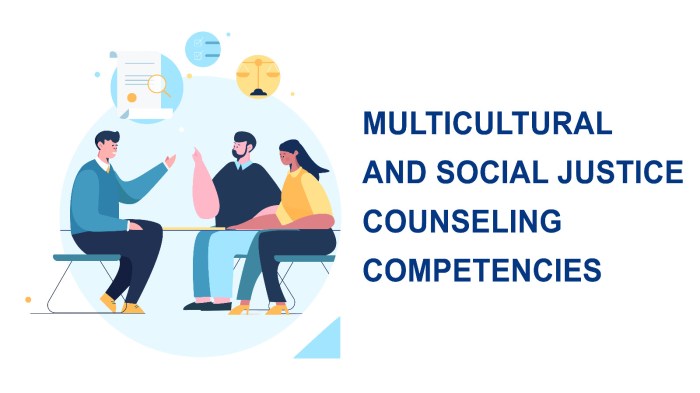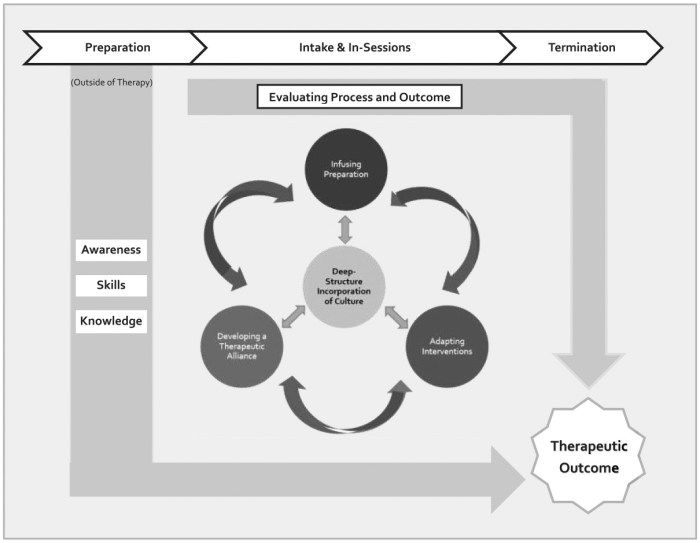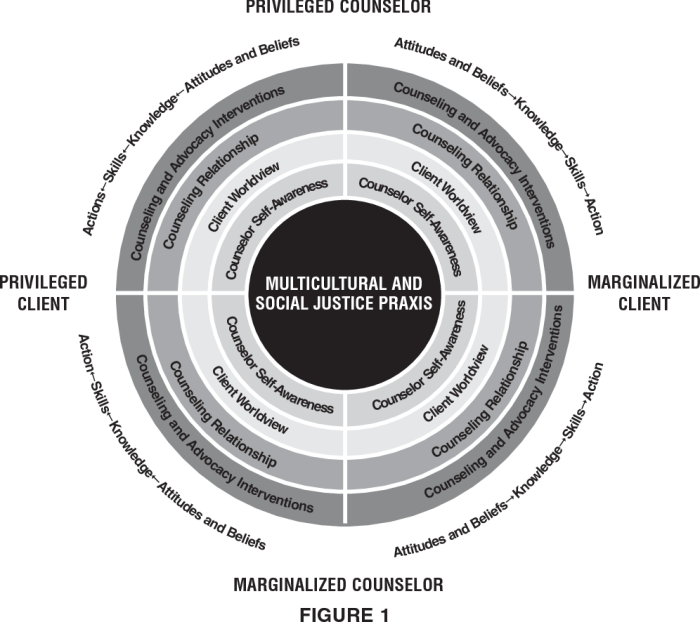Multicultural and social justice counseling competencies are essential foundations for fostering inclusive and transformative therapeutic spaces. This framework empowers counselors to navigate cultural diversity, advocate for marginalized communities, and promote social equity in counseling practice.
Understanding the impact of cultural factors on counseling, recognizing the principles of social justice, and embracing cultural humility are crucial for effective counseling interventions. This Artikel explores these competencies, emphasizing their significance in shaping culturally responsive and socially responsible counseling practices.
Multicultural Counseling Competencies: Multicultural And Social Justice Counseling Competencies
Multicultural counseling competencies are essential for counselors working with clients from diverse cultural backgrounds. These competencies include the ability to understand and respect cultural differences, to communicate effectively with clients from different cultures, and to provide culturally appropriate services.
Cultural Awareness in Counseling
Cultural awareness is the foundation of multicultural counseling. Counselors must be aware of their own cultural biases and how these biases might impact their work with clients. They must also be knowledgeable about the cultural backgrounds of their clients and how these backgrounds might influence their thoughts, feelings, and behaviors.
Challenges of Working with Clients from Diverse Cultural Backgrounds, Multicultural and social justice counseling competencies
Working with clients from diverse cultural backgrounds can be challenging. Counselors may encounter language barriers, cultural misunderstandings, and differing values. They must be prepared to address these challenges in a culturally sensitive and respectful manner.
Social Justice Counseling Competencies
Social justice counseling competencies are essential for counselors who want to advocate for clients who are experiencing social injustice. These competencies include the ability to understand the principles of social justice, to identify and address social injustice, and to work with clients to create social change.
Principles of Social Justice Counseling
The principles of social justice counseling include:
- Dignity and worth of all people
- Equity and justice
- Diversity and inclusion
- Empowerment
Role of Social Justice Counselors in Advocating for Clients
Social justice counselors play a vital role in advocating for clients who are experiencing social injustice. They can help clients to understand their rights, to access resources, and to take action to create social change.
Intersectionality in Counseling

Intersectionality is a framework for understanding how multiple forms of oppression and discrimination intersect to create unique experiences for individuals. Counselors must be aware of the ways in which intersectionality can impact their clients and be prepared to address these issues in a culturally sensitive and responsive manner.
Impact of Intersectionality on Counseling
Intersectionality can impact counseling in a number of ways. For example, a counselor working with a client who is a woman of color may need to be aware of the ways in which racism and sexism intersect to create unique challenges for this client.
Addressing Intersectionality in Counseling
Counselors can address intersectionality in counseling by:
- Being aware of their own biases and how these biases might impact their work with clients.
- Educating themselves about the experiences of clients from diverse backgrounds.
- Using a strengths-based approach that focuses on the client’s resilience and ability to overcome challenges.
Cultural Humility in Counseling

Cultural humility is a lifelong process of self-reflection and learning about other cultures. Counselors who practice cultural humility are aware of their own cultural biases and are open to learning from others. They are also willing to challenge their own assumptions and to change their behavior in order to be more culturally responsive.
Importance of Cultural Humility in Counseling
Cultural humility is important in counseling because it helps counselors to create a safe and welcoming environment for clients from all backgrounds. It also helps counselors to provide culturally appropriate services that are tailored to the needs of individual clients.
Principles of Cultural Humility
The principles of cultural humility include:
- Self-awareness
- Openness to learning
- Willingness to change
Cultural Responsiveness in Counseling
Cultural responsiveness is the ability to provide services that are tailored to the cultural needs of clients. Counselors who are culturally responsive are able to understand and respect the cultural backgrounds of their clients and to use this understanding to provide effective services.
Importance of Cultural Responsiveness in Counseling
Cultural responsiveness is important in counseling because it helps counselors to create a safe and welcoming environment for clients from all backgrounds. It also helps counselors to provide services that are effective and meaningful for clients.
Principles of Cultural Responsiveness
The principles of cultural responsiveness include:
- Respect for cultural diversity
- Understanding of cultural context
- Use of culturally appropriate interventions
Advocacy in Counseling

Advocacy is a process of speaking out on behalf of clients who are experiencing injustice. Counselors can advocate for clients in a number of ways, including:
- Providing information about clients’ rights
- Helping clients to access resources
- Speaking out against injustice
Role of Counselors in Advocating for Clients
Counselors have a unique role to play in advocating for clients who are experiencing injustice. Counselors can use their knowledge of the counseling process and their understanding of the experiences of clients from diverse backgrounds to help clients to speak out against injustice and to create social change.
Training and Education in Multicultural and Social Justice Counseling
Training and education in multicultural and social justice counseling is essential for counselors who want to work with clients from diverse backgrounds and to advocate for social justice. This training should include:
- Knowledge of the principles of multicultural and social justice counseling
- Skills in working with clients from diverse backgrounds
- Experience in advocating for social justice
Core Competencies of Multicultural and Social Justice Counseling
The core competencies of multicultural and social justice counseling include:
- Cultural awareness
- Cultural humility
- Cultural responsiveness
- Advocacy
Training Programs in Multicultural and Social Justice Counseling
There are a number of training programs in multicultural and social justice counseling available. These programs can help counselors to develop the skills and knowledge they need to work with clients from diverse backgrounds and to advocate for social justice.
Common Queries
What is the significance of cultural awareness in counseling?
Cultural awareness enables counselors to understand the unique perspectives, values, and beliefs of clients from diverse backgrounds, fostering culturally sensitive and effective interventions.
How can counselors address intersectionality in counseling?
Counselors can address intersectionality by recognizing the multiple identities and experiences of clients, considering how these identities intersect and shape their experiences, and tailoring interventions accordingly.
What are the core principles of cultural humility?
Cultural humility involves recognizing one’s own cultural biases, seeking to understand clients’ cultural perspectives, and continuously engaging in self-reflection and learning.